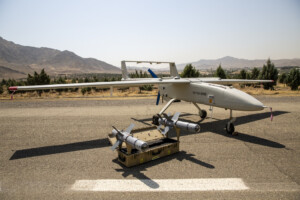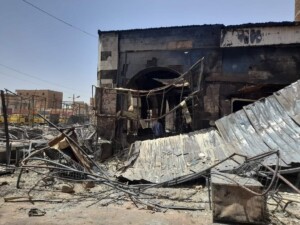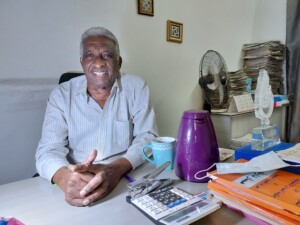Prof Siddig Tawir: ‘Both civilian and military members of Sovereign Council work in harmony’
Member of Sudan’s Sovereign Council, Prof Siddig Tawir, attests to the “harmonious relationship between the civilian and military members of the Sovereign Council”. During his official visit to the Netherlands, Tawir discussed the possibility of bilateral cooperation between two countries.
 Member of the Sovereign Council, Prof Siddig Tawir (c), arrives with Minister of Culture and Information Feisal Mohamed Saleh (r) and Radio Dabanga editor-in-chief Kamal El Sadig (l) at a celebration event at the National Museum in Khartoum on January 22 to honour the Heroic Voices of Radio Dabanga
Member of the Sovereign Council, Prof Siddig Tawir (c), arrives with Minister of Culture and Information Feisal Mohamed Saleh (r) and Radio Dabanga editor-in-chief Kamal El Sadig (l) at a celebration event at the National Museum in Khartoum on January 22 to honour the Heroic Voices of Radio Dabanga
Member of Sudan’s Sovereign Council, Prof Siddig Tawir, attests to the “harmonious relationship between the civilian and military members of the Sovereign Council”. During his official visit to the Netherlands, Tawir discussed the possibility of bilateral cooperation between the two countries.
During an interview with Radio Dabanga on Thursday, Tawir asserted that there is one sovereign council that functions and governs by the constitutional document. The constitutional document explained in detail the obligations and tasks of the Sovereign Council during the three years of the Transitional Period,” he said. He further denied the circulated rumours around the existence of the alignment of a civilian versus military component within the Sovereign Council.
He also rebutted the allegations that the military group within the Sovereign Council dominates the process of the ongoing peace talks. He explained that the Sovereign Council is authorised to sponsor the peace process and thus it has a negotiating delegation works in full cooperation and harmony with the cabinet, as the responsible executive authority for managing these issues. “We complete each other whether militarily or civilian members in Sovereign Council,” he added.
Appointing States governors
Tawir explained that the issue of appointing the state governors and the legislative council has not occurred yet because of the complications and diverging views in the current peace negotiation processes. Some negotiating parties requested that the appointment of the state governors and the legislative council should not be decided until a peace agreement can be reached.
However, given the recent events and the challenges ahead, the issue of appointing the state governors and the legislative council must be reconsidered. He further clarified that this issue has created an unusual and uncomfortable situation for the Sovereign Council and the Cabinet for the legislative branch needs a broad representation of Sudanese people. Hence conditioning the legislative branch on the outcome of ongoing peace negotiations is a disruption of the legislative branch and supervisory apparatus of the transitional government.
“For these reasons, there are only two options; the first is to reserve certain seats in the legislative council for the armed movements until a final peace agreement can be concluded. The second option is to form the legislative council for now and to be reviewed once a peace deal is reached,” he explained. The consultation in this matter is proceeding amicably in a manner that preserves the rights of armed movements and provides an opportunity to reactivate the role of the legislative council, he said.
Visiting the Netherlands
During his current official visit to the Netherlands, Tawir discussed bilateral cooperation relations between the two countries in the fields of economy, development, and Sudan’s plans for economic reform to support the country’s democratic transformation.
In a statement on Thursday, Sudan’s Sovereign Council said that Tawir met with Dutch Foreign Minister Stef Blok in Amsterdam, in which Tawir explained the democratisation process in Sudan, especially the developments about the peace process. During the meeting, Tawir explained Sudan’s efforts to achieve peace in the current peace talks in Juba.
Minister Blok explained that the Netherlands understands the challenges that Sudan is going through and they are willing to support. He further clarified that the relationship between his country and Sudan is 60 years old relationship.
“Given the fact that the Netherlands is a member of the ‘Friends of Sudan Group’ we will work with our international partners to support Sudan,” Blok said. He also expressed his aspiration to develop the relations between the two countries at all levels. The political atmosphere in Sudan has become more favourable than ever before, he added.
Tawir also met with the Director of the Investment Guarantee and Promotion Agency and the head of the agency’s African division. The meeting discussed the cooperation between the two countries and the role that the Netherlands can play in developing in the fields of agriculture, education or scholarships.
The meeting also touched on the arrangements for the upcoming visit of the Minister for Foreign Trade and Development Cooperation, Sigrid Kaag to Sudan in mid-February. The visit is about strengthening the strategic and political cooperation with Sudan and the Horn of Africa countries.
Radio Dabanga’s editorial independence means that we can continue to provide factual updates about political developments to Sudanese and international actors, educate people about how to avoid outbreaks of infectious diseases, and provide a window to the world for those in all corners of Sudan. Support Radio Dabanga for as little as €2.50, the equivalent of a cup of coffee.












 and then
and then